Keywords play a massive role in improving the ranking of your digital marketing business. Many invest thousands of dollars to get suitable keyword searches for their content to put it into the limelight.
However, selecting the optimum keywords can be a bit daunting and you need to analyze whether the keyword you want to use will be beneficial for your content or not. However, with many keyword search tools in place, this tedious task has become a bit easier.
These tools work by sorting the best keyword for your content and overall web strategy. There exist mainly two kinds of keyword search tools i.e. a basic keyword research tool that uses the seed keyword to locate profitable keywords and competitor-based keyword research, which looks for proven keywords helping other websites to draw traffic.
Through this post, we will present to you some of the best keyword search tools to gauge more traffic!
Importance of Keyword Research
You should prioritize your keyword research for these key reasons.
- Understanding Search Intent: Keyword research helps you comprehend what people are looking for in your niche. With this information, you can then finetune your content appropriately.
- Identifying Relevant Keywords: Identifying and targeting the right keywords will potentially increase your site’s ranking on SERPS.
- Improving Website Traffic: Notably, correct keywords will help you gain more organic traffic to your site. This will in turn enhance engagement, conversions, and revenue.
How to Use Keyword Research Tools
Please follow these steps to use keyword research tools correctly.
- Identify Your Keyword Research Goals: Begin by spelling out your goals for keyword research. Goals may include increasing website traffic, targeting specific audiences, or increasing sales.
- Choose a Keyword Research Tool: Choose a tool from the free and paid options available.
- Enter Seed Keywords: Enter a broad term related to your business or topic to generate keyword ideas. Use the list that comes to generate more specific keyword ideas.
- Generate Keyword Ideas: Use the tool to generate related phrases or keywords. Explore variations, long-tail keywords, and phrases that align with the search intent.
- Analyze Keyword Data: Look at the relevant metrics to determine if a given keyword could be a good pick.
- Competitor Analysis: Some tools offer the ability to analyze competitor keywords. Study what keywords your competitors are ranking for and consider if you can target similar terms or discover untapped opportunities.
- Refine Your Keyword List: Group the selected phrases based on relevancy, content topics, and key metrics. Prioritize keywords on your goals.
- Use Keywords in Your Content: Use the selected keywords in your website content, including titles, headings, and body text.
- Monitor and Adjust: Monitor your website ranking and traffic consistently. This will give you a glimpse of how your keyword strategy is performing.
Long Tail Keywords and Their Significance
Long-tail keywords consist of a group of words (phrases) that are longer and more detailed than generic keywords. They usually range from three to five words.
They are significant for ranking on SERPs due to their high conversion rates, less competition, and better user experience. They also stand out for their voice search relevance, higher conversion rates, and improved ROI.
While long-tail keywords may individually have lower search volume, they collectively make up the majority of searches on the internet. Leveraging these specific phrases can attract a highly targeted audience, leading to better engagement, conversions, and overall improved SEO performance.
Understanding Search Volume and Keyword Difficulty
Search volume and keyword difficulty are two important metrics in keyword research.
Search Volume
Search volume number of online searches of a particular keyword or phrase within a given duration, typically a month. It indicates the level of interest or demand for that particular term in search engines.
A higher search volume means that the keyword is searched more frequently, and the reverse is true.
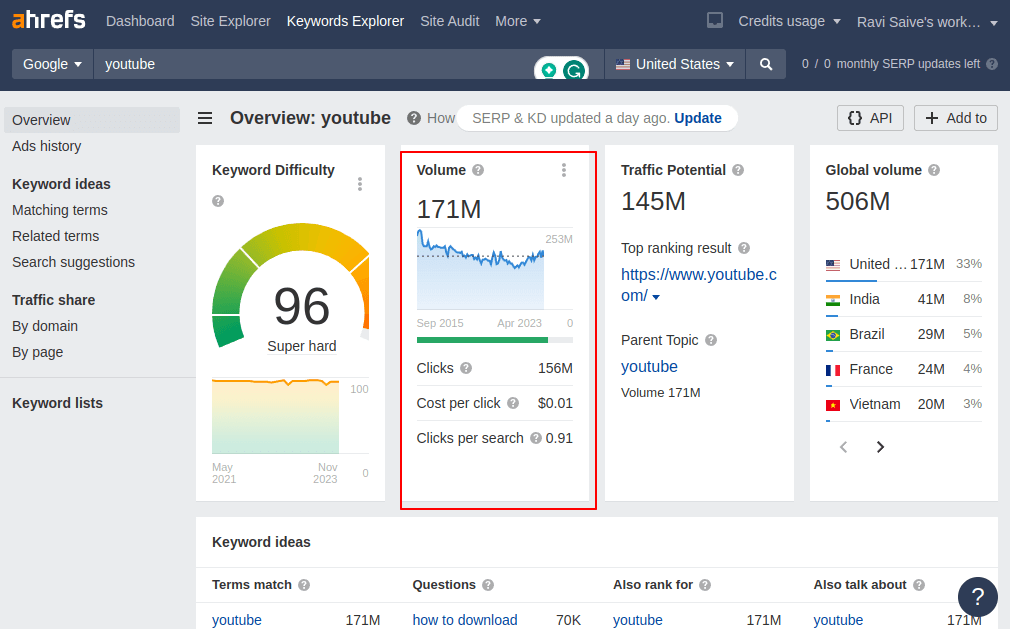
The importance of this metric includes:
- It helps identify the popularity of a given phrase.
- High search volume keywords generally imply a larger potential audience but also mean higher competition.
- Low search volume keywords might be more niche and specific, potentially leading to less competition but a smaller audience.
Keyword Difficulty
Keyword amount of effort you will need to rank for a keyword on search engine results pages (SERPs). This metric assesses the competitiveness of a keyword based on various factors, such as the number of websites already ranking for that keyword and content quality, among others.
To rank for a specific keyword in Google’s search results, the difficulty level is measured on a scale from 0 to 100, where 0 represents the easiest and 100 signifies the most challenging.
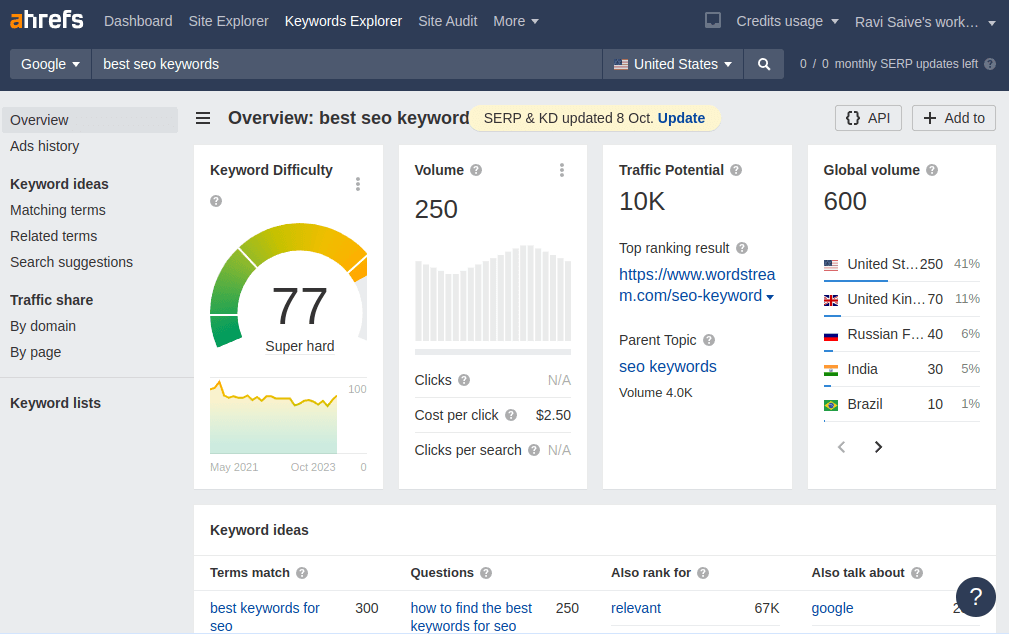
Key Points About Keyword Difficulty:
- High keyword difficulty means it’s more challenging to rank for that specific keyword.
- Lower difficulty suggests it might be easier to rank, but it could also indicate lower search volume.
- Assessing keyword difficulty helps in selecting keywords that strike a balance between relevance and attainability based on the website’s authority and competitiveness.
Relationship Between Search Volume and Keyword Difficulty
- Usually, high search volume has higher keyword difficulty because many websites compete for those terms.
- Lower search volume keywords may have lower difficulty due to fewer competitors, but they might also attract fewer visitors.
- Balancing search volume and keyword difficulty is essential. Strive to find phrases with realistic search volumes and practicable difficulty to achieve a good ranking.
Understanding these metrics is crucial for developing an effective keyword strategy. It involves finding the right balance between search volume and keyword difficulty to target terms that bring in relevant traffic and are achievable to rank for in search engines.
Statistics About Keyword Research In SEO
The following are some of the notable facts and statistics about keyword research in SEO.
- 93% of online sessions start from a search engine.
- 94.74% of keywords get 10 monthly searches or fewer.
- Around 70% of search queries contain at least four words.
- 43.9% of marketers look at keyword rankings to measure SEO success.
- About three-quarters (75%) of successful digital marketers leverage keyword research in content creation.
Top 12 Best SEO Keyword Research Tools for Better Ranking
In this article, we will discover superior SEO with the best keyword research tools for enhanced website ranking and visibility in search engines.
1. Soovle – Keyword Search Tool
Soolve offers a comprehensive keyword research platform that brings together search suggestions from various search engines like Google, Bing, YouTube, Amazon, and Wikipedia in one convenient interface.
Its standout feature lies in providing instant insights into trending search queries across multiple platforms. This facilitates a holistic approach to keyword exploration. Soolve’s user-friendly design simplifies the process of discovering diverse keyword ideas.

2. TopicRanker – Topic Research Tool
Anyone new to keyword research tools will find TopicRanker the best bet. This topic research tool will help you identify keywords based on the shortfalls that it will find in the search results.
But why does TopicRanker stand out? This tool stands out because it focuses on providing you with easy-to-rank keywords for your website. This free tool will search various search engines for easy-to-rank keywords.
If you are looking for a tool that will help you find easy-to-rank long-tail keywords and uncover new keyword opportunities, this is your kind of keyword research tool.
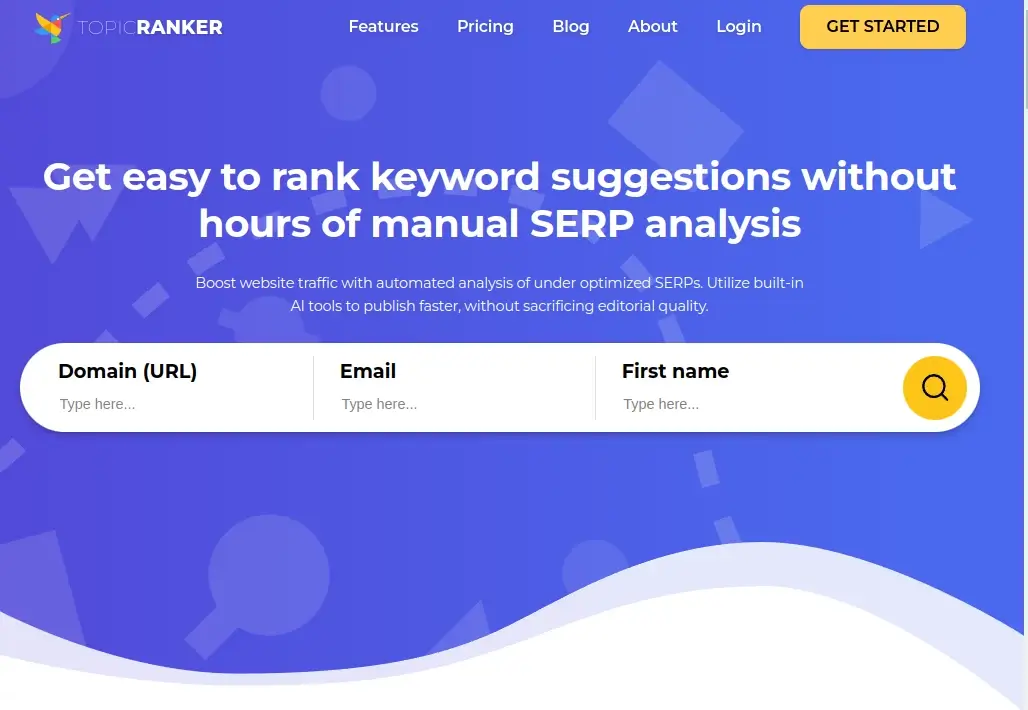
3. Jaaxy – The world’s Most Advanced Keyword Tool
Jaaxy is a popular keyword research tool ideal for finding high-opportunity keywords. Notably, it assists in finding profitable niches by offering insights into popular trends and potential opportunities within a given niche.
Jaaxy stands out for its simplicity and the depth of information it provides, making it an efficient tool for keyword research and SEO strategy development. It can handle an array of metrics including keyword research, competitor analysis, and site ranking.

4. Google Search Console
Google Search Console provides webmasters and digital marketers with great insights into their site’s performance in Google search results. This powerful tool can help you monitor and manage your site’s presence in Google’s search index.
While this is a free tool, you will still need to sign in to your Google account and verify ownership of their website if you want to use the service. You can then use it to find long-tail keywords and uncover new keyword opportunities.
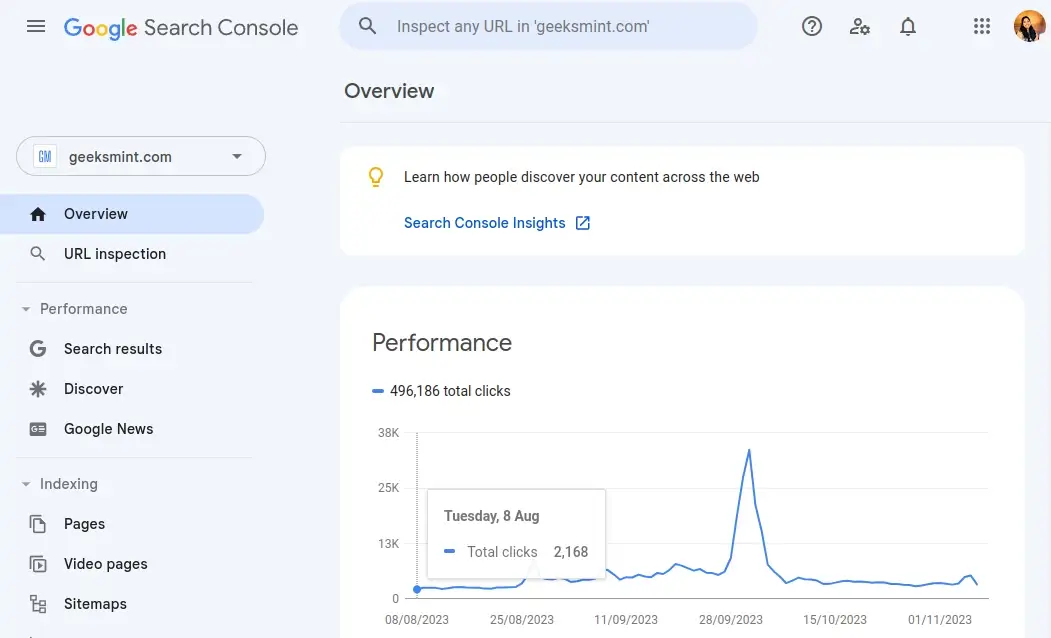
5. SECockpit – Keyword Research Tool for SEO and Google Ads
SECockpit is a keyword research tool for SEO and Google Ads. It offers various features that streamline the keyword research process and provide comprehensive data for informed decision-making.
Moreover, it provides insights into keyword competition, search volume, cost-per-click (CPC), and potential traffic estimates for chosen keywords.
SECockpit is a robust tool, particularly appreciated for its in-depth keyword analysis and competition metrics. It offers a wide array of features that cater to professionals looking for a comprehensive understanding of keywords, competition, and potential traffic estimates.
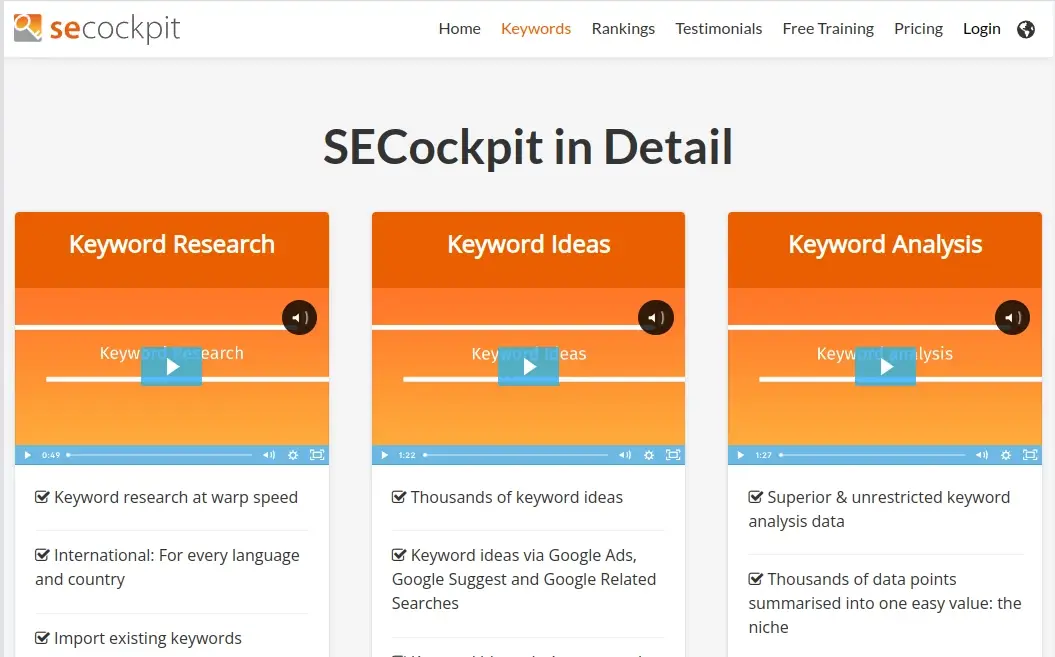
6. KeywordTool.io – Google Keyword Planner
If you are looking for a free tool that comes with premium features, Keywordtool.io is a perfect choice. This tool leverages the Google Autocomplete feature to generate tons of good long-tail keywords. It stands out as a great tool for finding long-tail phrases and related keywords.
You can use Keywordtool.io to generate keyword ideas or expand your existing list of keywords. It is a great choice for beginners who prefer a simple tool. Besides, the tool is useful for various applications, including PPC campaigns, copywriting, and niche evaluation.
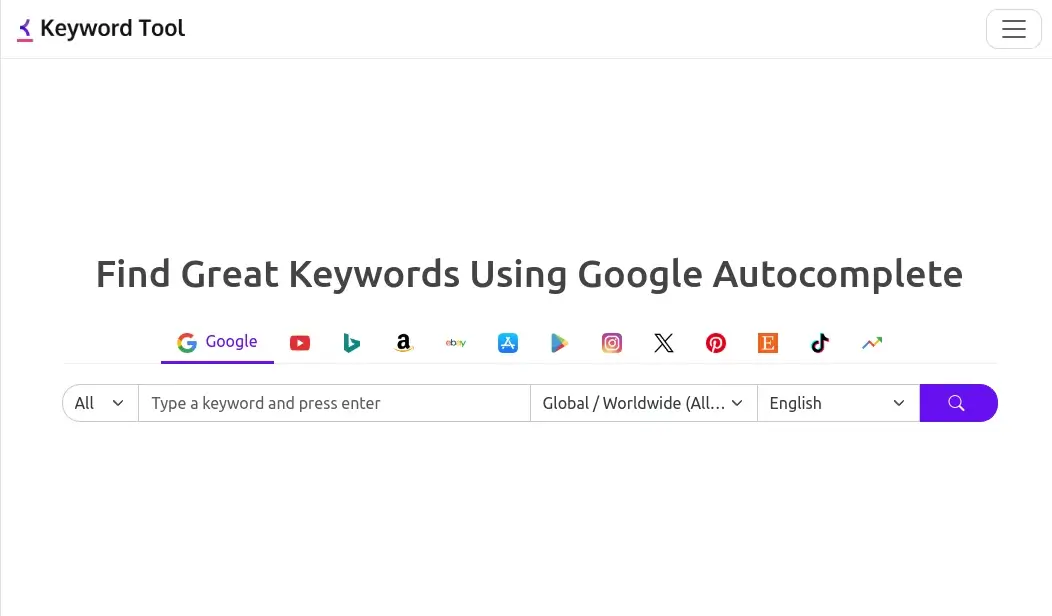
7. Moz Keyword Explorer – Keyword Research Tool
Moz Keyword Explorer is a popular keyword research tool for SEO and Google Ads. It is a web-based tool that provides keyword suggestions from multiple sources, including Google Keyword Planner, Suggest, Related Searches, YouTube, and Amazon.
Moz Internet Explorer is designed to help users find easy-to-rank keywords for their website and provides a user-friendly interface and a variety of features, including keyword research, competition analysis, and domain search. Besides, Moz Keyword Explorer can perform a full analysis of the top-ranked pages for each keyword.
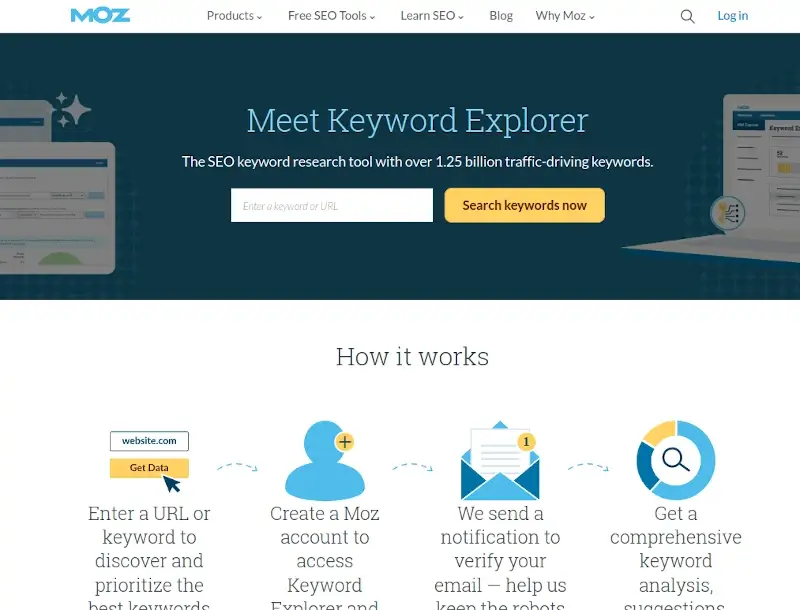
8. Keywords Everywhere – Keyword Tool
Another platform that makes it to our list of best SEO keyword research tools is Keywords Everywhere. It is designed to help users find easy-to-rank keywords for their websites and provides a user-friendly interface and a variety of features, including keyword research, competition analysis, and domain search.
Keywords Everywhere will easily provide you with real-time data. The tool is available as Chrome and Firefox extensions. Thus, you can use it without having to download and install it on your device.
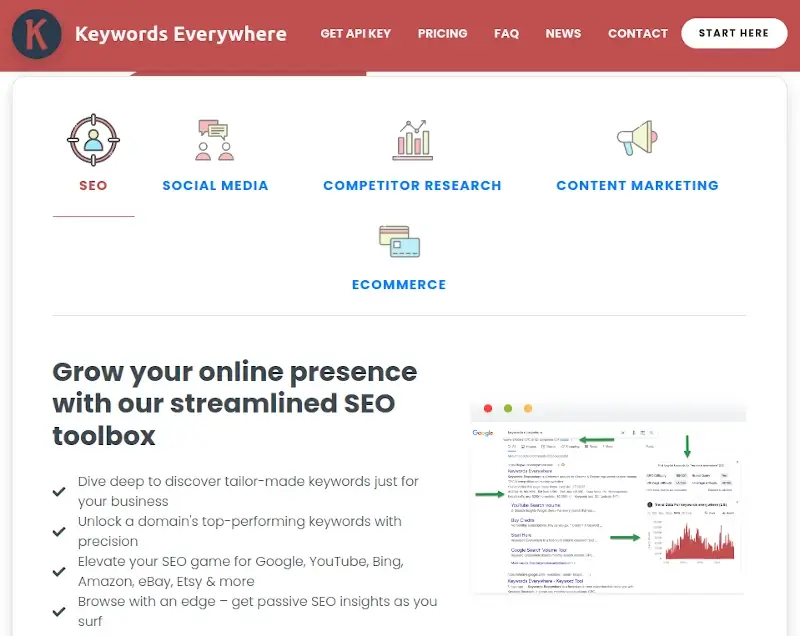
9. Keyword Snatcher – Find Niches
Keyword Snatcher scrapes keyword suggestions from various search engines, specifically targeting Google, Bing, Yahoo, and Amazon, providing an extensive list of potential keywords. It focuses on providing long-tail keywords, and this is ideal for targeted traffic.
This tool enables you to filter keywords by language and location, allowing for localized or international keyword research. Besides, you can input a starting keyword, and the tool generates a wide array of related keywords and phrases.
Keyword Snatcher is appreciated for its ability to gather a broad range of long-tail keywords from multiple search sources. It can be particularly useful for content creators and marketers looking for specific, less competitive keywords that cater to niche audiences.

10. QuestionDB – Free Keyword Questions Tool
The next software on our review is QuestionDB, a tool that stands out for its unique focus on question-based keywords, empowering content creators and marketers to address specific user inquiries. While it is not a traditional keyword research tool, it aggregates and organizes real questions asked across various online platforms, such as forums, communities, and Q&A websites.
You can access search volume data and trends related to the generated question-based keywords, enabling a better understanding of the potential audience interest.
These questions can then be used as long-tail keywords for various purposes. For example, this helps develop content strategies and optimize content around user queries, providing insights into popular topics, and facilitating the creation of valuable, user-centric content.
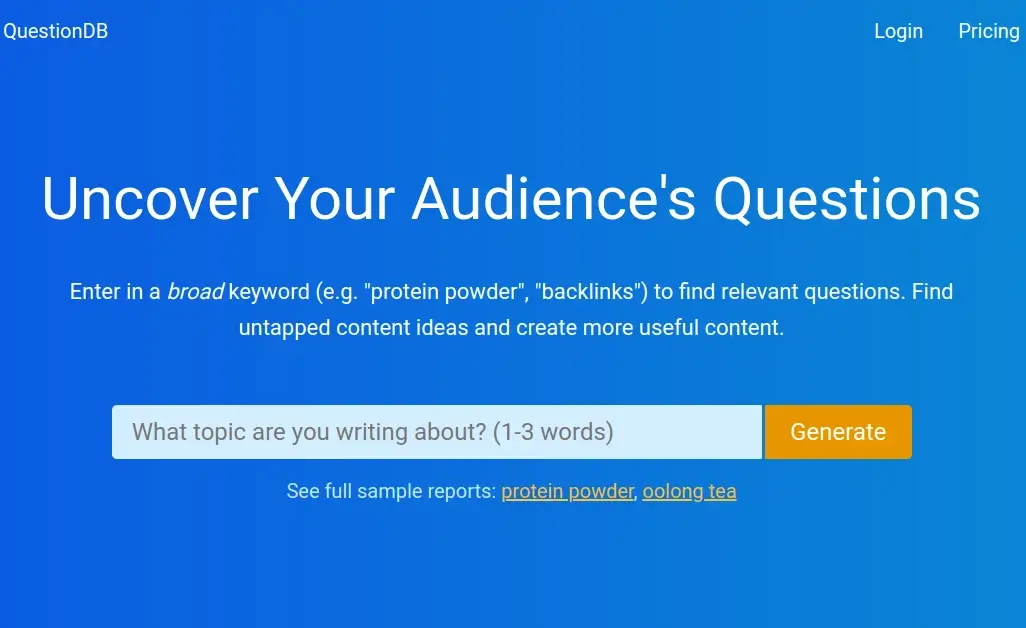
11. AlsoAsked – People Also Ask Keyword Research Tool
AlsoAsked is a keyword research tool that specializes in visualizing and providing data on “People Also Ask” (PAA) boxes in Google search results. Once done, it will display related questions that users commonly ask on a specific topic.
The tool assists content creators and SEO professionals by offering insights into related queries, helping them understand user intent, and generating content ideas that align with users’ interests and queries.
AlsoAsked stands out for its focus on “People Also Ask” boxes, offering a visual and insightful approach to discovering related questions and content ideas. It assists content creators and SEO professionals by providing a visually appealing representation of related queries, helping them generate user-centric content.
The tool’s emphasis on user intent and its visual presentation of interconnected questions make it a valuable resource for content planning and keyword expansion.
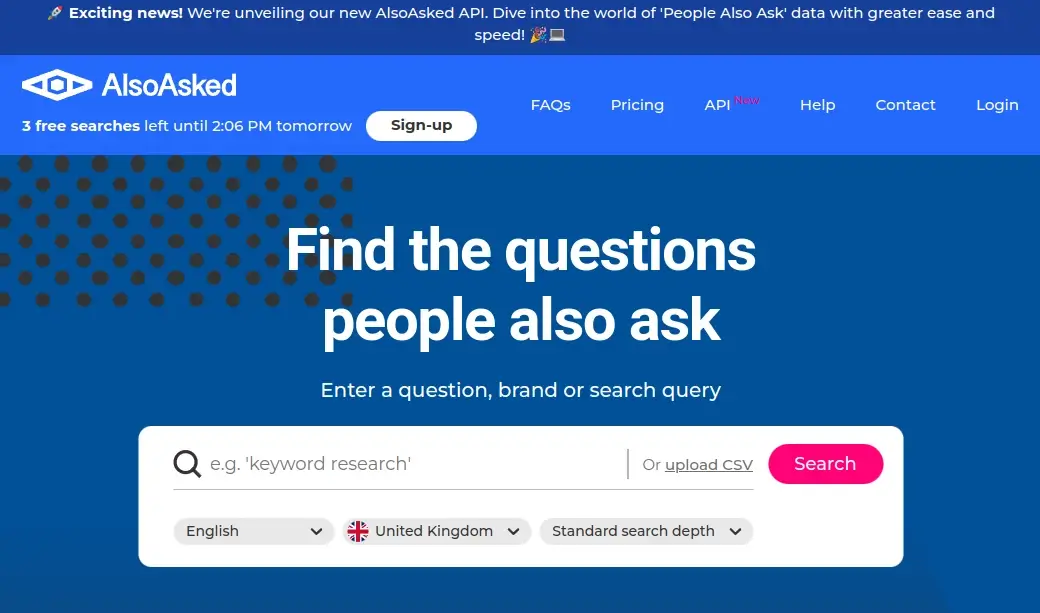
12. Ubersuggest – Keyword Research Tool
Ubersuggest, created by Neil Patel, provides all-round SEO capabilities ranging from keyword research, competitor analysis, and site audits, among others. It provides keyword suggestions from multiple sources, making it one of the most reliable tools.
Ubersuggest is a powerful SEO tool that unlocks the potential of keyword research. Ubersuggest is designed to help users find easy-to-rank keywords for their website and provides a user-friendly interface and a variety of features, including keyword research, competition analysis, and domain search.
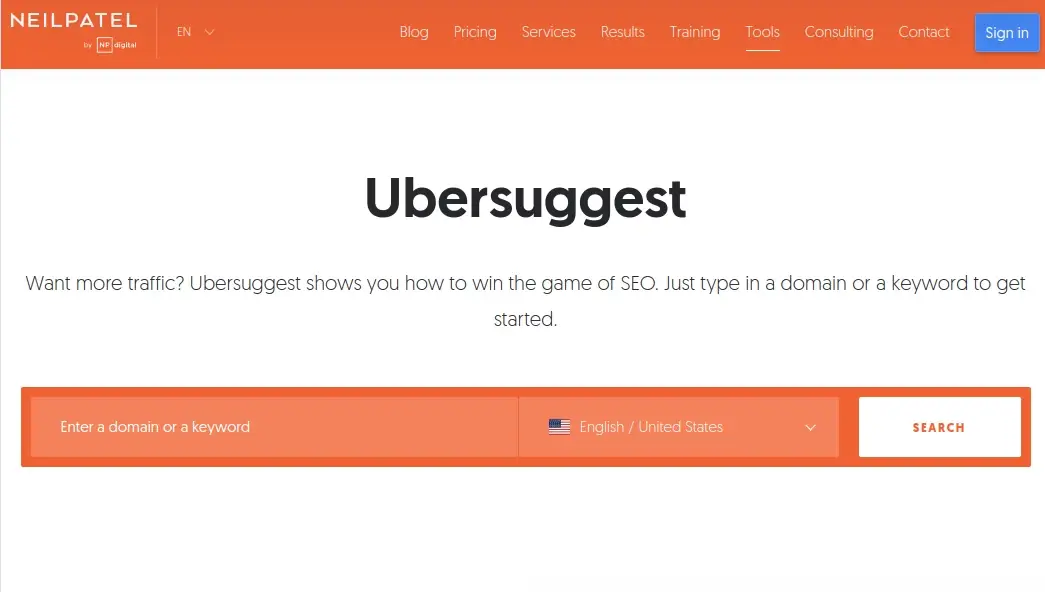
13. SEMRUSH – Keyword Magic Tool
Semrush lets you perform more than just searching for keywords. It lets you research in a versatile way by finding keywords using seed keywords, driving traffic to the competitors, and keyword gap analysis.
Besides presenting the keyword data, it allows you to see month-wise search volume, keyword difficulty, and CPC for PPC. it also features Keyword suggestions by presenting keyword variations and related keywords to let you explore more search terms than expected, making it simpler for you to locate short and long-tail keywords.
It performs detailed keyword data searches like Adsense CPC, Search engine reports, Keyword traffic volume, etc. while providing an option to manage the keyword list based on the difficulty score to locate the low competition keywords. It also features backline analysis, keyword manager, keyword difficulty tool, etc.

Give Semrush a try with 7-day Free Trial, which gives access to all the great marketing tools Semrush offers for a full week.
To start your trial, simply provide your card details, but do not worry if you wish to cancel before the trial ends, you won’t be charged.
Once the 7 days are up, you’ll automatically switch to the paid plan you selected unless you cancel before then.
14. KWFinder – Free Keyword Research and Analysis Tool
If you are on the search for a one-stop-shop tool to perform keyword searches then KWFinder is the best choice! This new tool is growing at a rapid rate and helps in finding the right keywords to drive maximum traffic.
It uses question-based keyword research options to quickly locate the long-tail keywords for problem-solving to generate more traffic and conversion. It comes in both free and paid versions and the basic plan works great for most of the users.
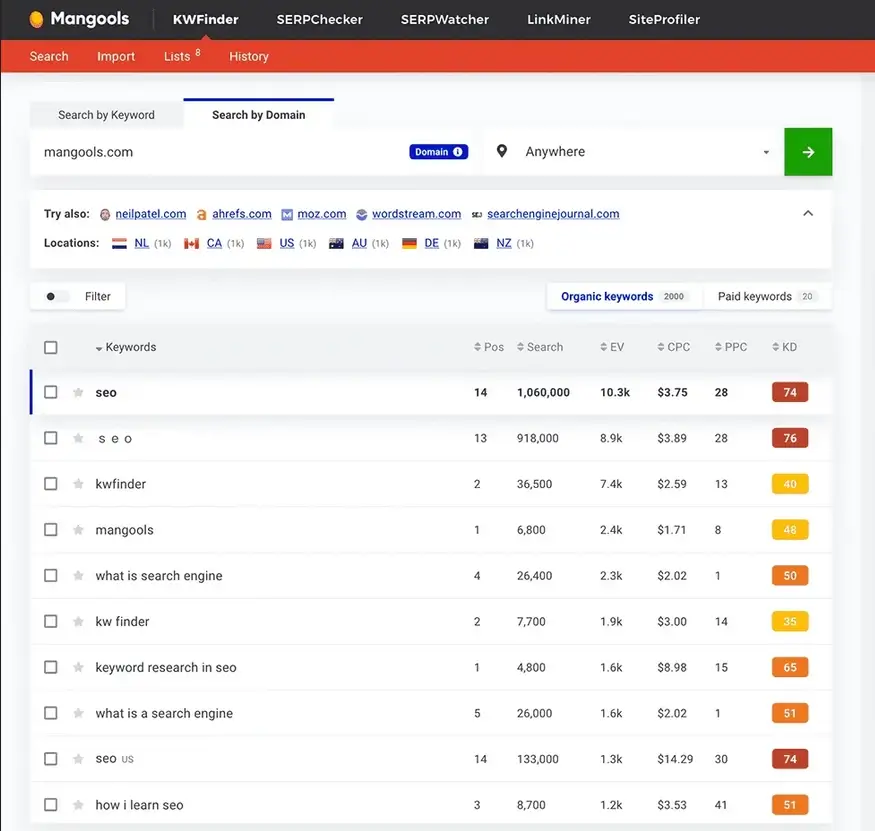
15. Answer The Public – Search Listening Tool
Answer The Public is free to use keyword research tools and makes an excellent choice to start with. This tool helps in finding the long-tail keywords based on seed keywords while presenting keywords in a variety of formats like questions, comparisons, and prepositions.
With the free plan, you can search for three keywords a day along with an option to choose the country and languages for your searches. However, it doesn’t provide sufficient keyword volume.

16. Ahref – Keyword Explorer Tool
Ahrefs Keyword Explorer Tool is seen as one of the most sought-after keyword research tools. It offers extensive details with keyword difficulty to drive traffic. It works using clickstream data to showcase the number of clicks from a search engine. You can make use of keyword generator tools to create ideas for Amazon, Google, YouTube, etc.
This tool becomes even more useful post knowledge graph integration because several keywords might have hefty traffic but they rarely receive clicks as they get answers from Google search.
Another impressive feature of this tool is its excellent user interface and the data it offers. It also provides SEO site audit, Backline analysis, etc. while letting you create a list of keywords to directly target from the dashboard without any need for using Excel.
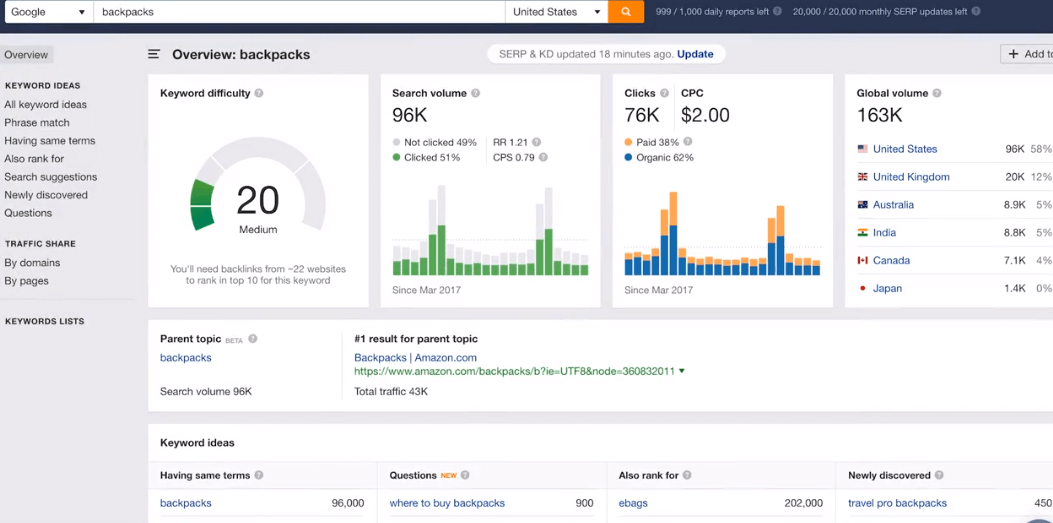
17. Google Keyword Planner – Keyword Research Tool
Google Keyword Planner is another most used keyword research tool due to being free and integrated with Google AdWords. You need to have an AdWord account to use this tool, which can be made for free.
Some of its features include deep information on Google whereas the limitations include that it won’t provide any information about how the keyword is performing on other search engines.
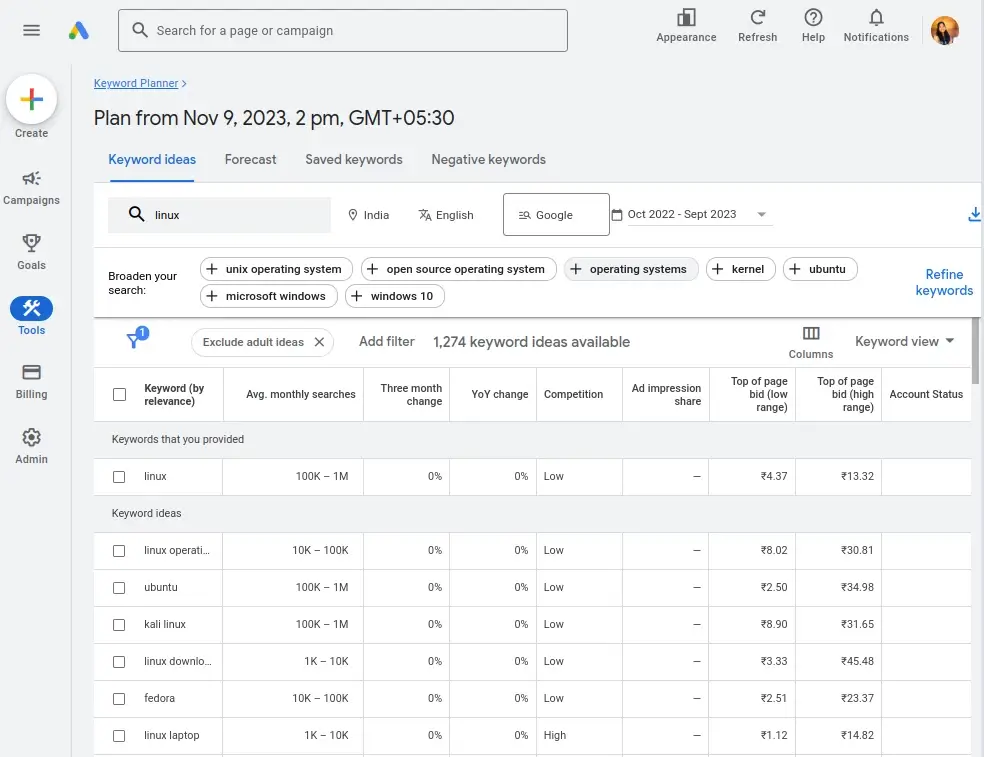
18. Keyword Surfer – Keyword Research Tool
Keyword Surfer is a useful keyword research tool crafted to enhance your website’s SEO strategy. It functions as an extra add-on to your web browser extension, seamlessly integrating with search engine result pages to provide valuable insights.
With Keyword Surfer, you can directly access essential metrics like search volume, CPC, and competition during your searches. This tool simplifies the process of choosing the right words, making it easier for users to optimize their websites for better visibility. It also aids users in understanding the popularity of certain words, allowing them to improve their content for Google.
Whether you’re a beginner or a professional, Keyword Surfer is here to guide you in making informed decisions for your website, increasing its chances of reaching a wider audience
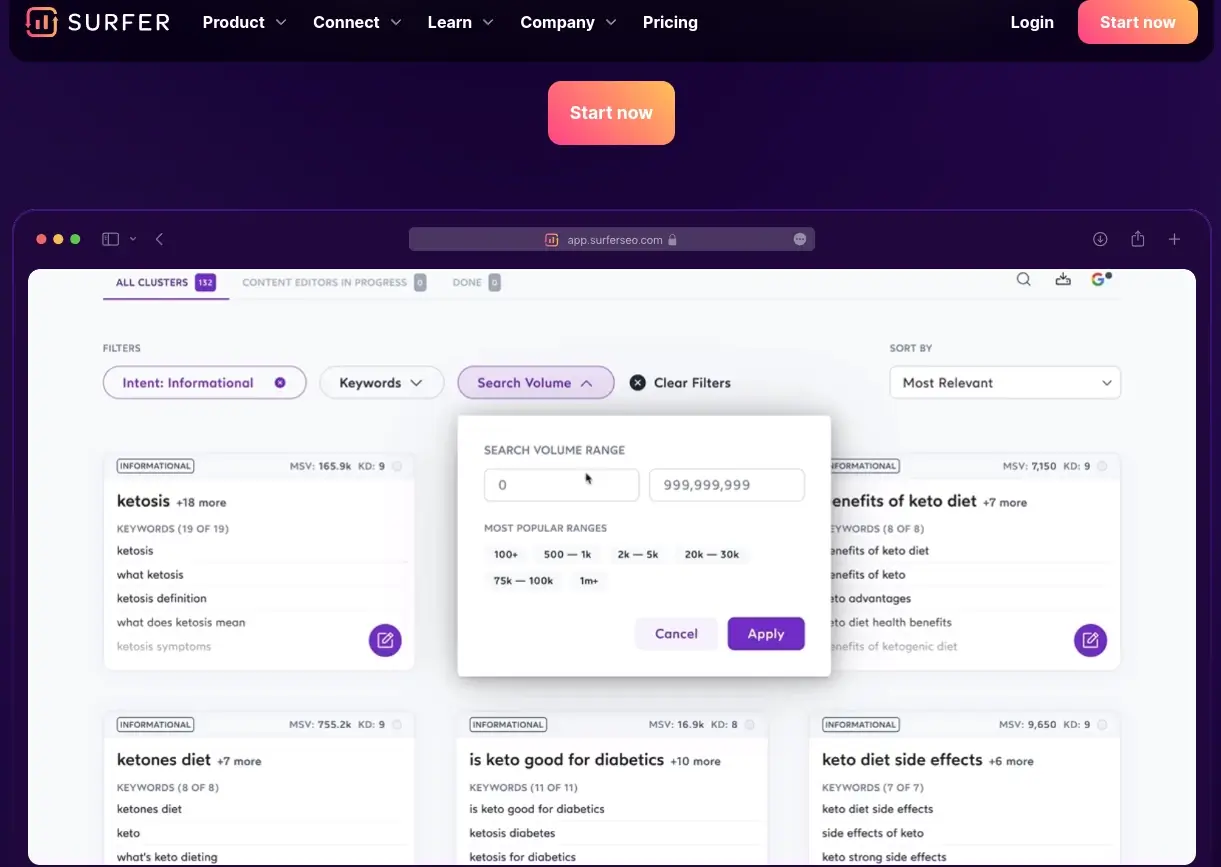
19. LongTailPro – Keyword Planner Tool
This cloud-based keyword research tool is yet another popular option. LongTailPro is a paid tool that offers a list of impressive keywords for your content or site. Its platinum version provides detailed keyword analysis with a competition checker to let you easily choose the right keyword.
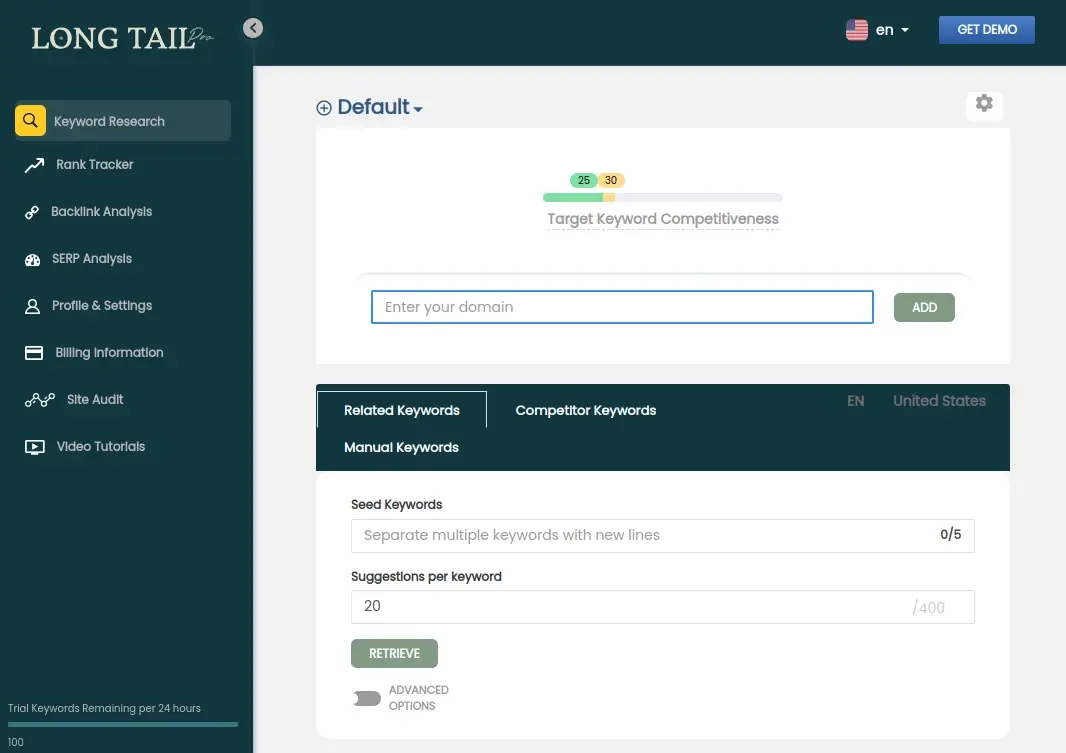
20. Serpstat – Keyword, Backlink and Competitor Analysis
Serpstat is a vast keyword research tool that helps in finding the winning keywords with details related to search volume, competition, keyword difficulty score, and CPC. With it, you get an option to search on Google and Yandex based on your country and it also helps in understanding the keyword search trend.
It includes detailed keyword difficulty scores that showcase the top 10 web pages with the highest keyword ranking including details like external backlinks, referring domains, and page rank. This sort of information helps in evaluation based on the rank for a specific keyword.
For PPC, Serpstat presents all the domains that are being advertised related to the target keyword and the kind of ads they are executing. Suitable for small businesses, it lets you build new links and develop strategic SEO platforms.
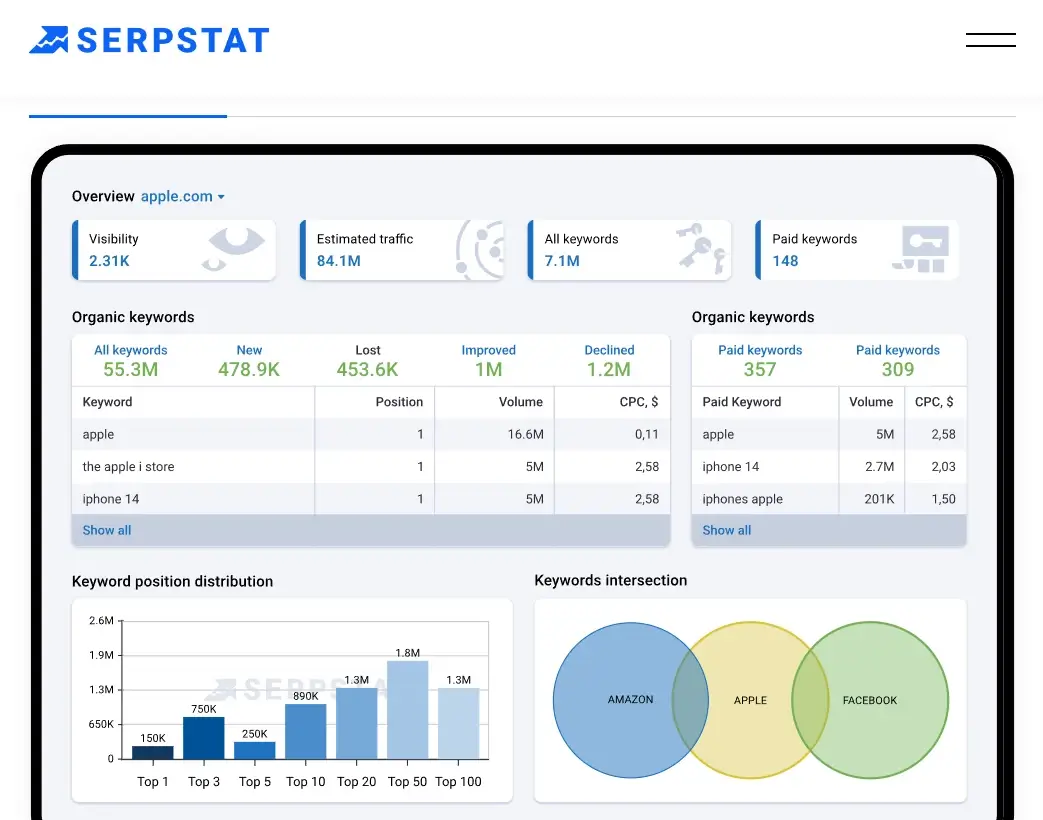
21. SpyFu – Competitor Keyword Research Tools
SpyFu is one of the best performers in the market! It works great if you are looking forward to analyzing and staying way ahead of the competitors in any popular niche. This tool is useful for comprehending the competitor’s SEO platform and discovering underserved or emerging markets.
It is equipped with features like comparing website modules, keyword history modules, domain history modules, and related keyword modules. However, it comes with a limitation that it doesn’t provide depth keywords, and also, it is monthly rather than real-time.
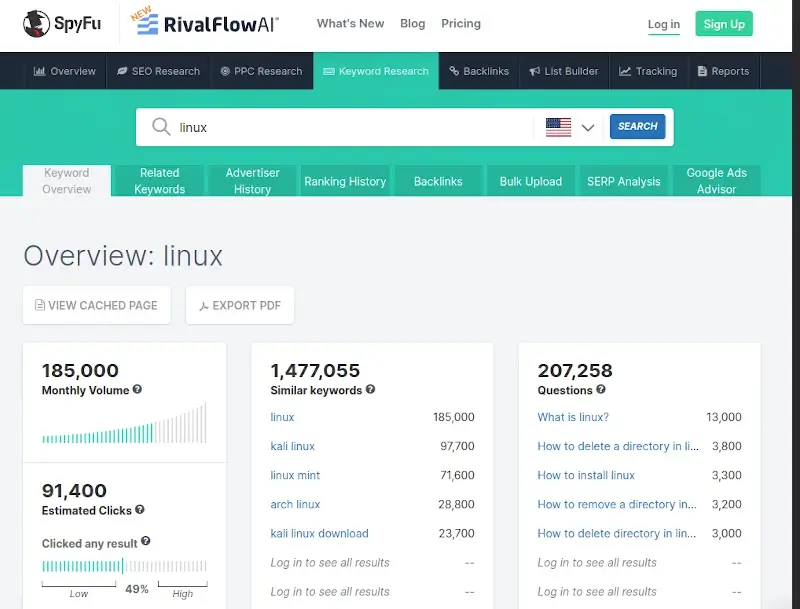
22. Google Trend – Google Keyword Research Tool
Google Trend is a free keyword research tool that provides data straight from Google! All its information can be blindly trusted including related queries, keyword popularity, and interest by region.
It allows you to compare two or more search queries to check the trend in traffic while being the only tool to showcase keyword popularity in different countries. After knowing in which region the keyword is popular, you can make use of oyster research tools to estimate the keyword search volume.
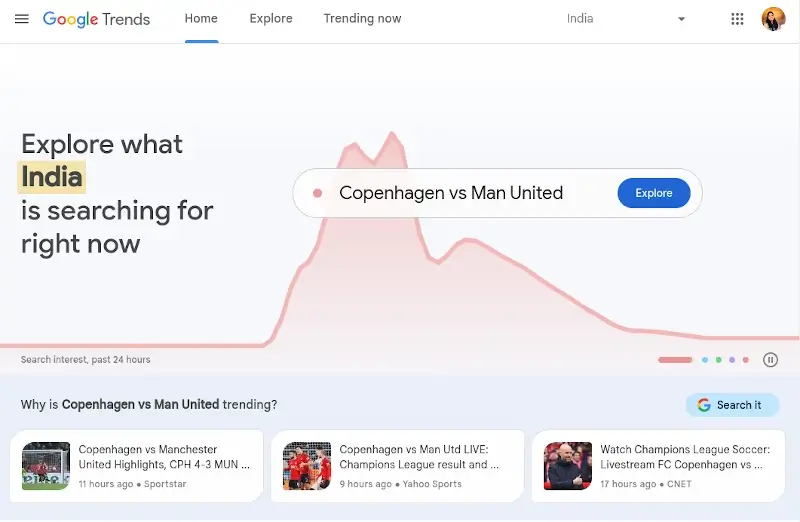
Frequently Asked Questions (FAQ’s) on SEO Keyword Research Tools
1. How can I improve my SEO keywords?
Improving your SEO keywords is essential for driving quality leads to your website and increasing your search ranking. These tips to help you improve your SEO keywords:
- Optimize for conversational search: Ideally, conversational search is often more organic, natural, and alluring to the average internet user. To optimize for conversational search, you need to anticipate likely queries by finding ways to predict the kinds of questions most people would ask.
- Use question keywords: Optimizing your website for question keywords will help generate a lot of organic traffic. With good traffic, chances that you will convert some of them into sales or returning customers will be high.
- Conduct keyword research: A good keyword research strategy uncovers queries and their popularity as well as an array of other metrics. Leverage the best SEO keyword research tools to achieve this more efficiently.
- Use relevant keywords: Choose words that are relevant to your niche and are in line with your content strategy. Research the chosen words and phrases by extensively using various tools and platforms.
2. What is the primary goal of keyword research in SEO?
The primary goal of keyword research in SEO is to identify the most relevant and profitable keywords for your website. Keyword research will help identify words that align with the search intent of your target population. Thus, these terms will provide you with insights that you need when updating or creating new content.
3. How do I choose the best keywords for my website?
Choosing the best keywords for your website involves using a keyword research tool of your choice to find keyword suggestions and analyzing various metrics related to each keyword.
You will also need to consider the search intent behind the keyword and whether it will drive quality traffic to your website. This aspect helps to identify the business value of each keyword at your disposal.
Next, find semantically related keyword phrases. Targeting semantically related keyword phrases to create a comprehensive keyword strategy enhances your chances to rank for related keywords and drive more traffic to your website.
Finally, analyze the metrics for the keywords used from time to time. Evaluate keyword metrics like search volume, competition, and difficulty in choosing the best keywords for your website.
4. Are long-tail keywords more effective?
The effectiveness of long-tail keywords versus short keywords depends on various factors and the specific goals of your SEO strategy. Both types have their merits and can be effective in different contexts:
Advantages of long-tail keywords:
- Long-tail keywords are considerably more definite, implying that they have a higher conversion rate.
- Long-tail keywords boast of considerably lower competition.
- They are perfect for reaching a targeted audience who are truly interested in what you offer.
Advantages of short-tail keywords:
- Short-tail keywords have higher search volume, which means they can generate more traffic and increase brand awareness.
- They can help you reach larger audience groups.
- They are suitable for targeting the top of the sales funnel.
Effectiveness?:
The effectiveness of either type depends on your SEO goals. Long-tail keywords are highly effective for niche marketing, attracting highly targeted and engaged users. Short keywords might bring in more general traffic but could be more competitive and less likely to convert.
5. How can I measure the performance of my chosen keywords?
Measuring the performance of your chosen keywords will include looking into the following metrics;
- Rankings: Monitor your keyword rankings on SERPs.
- Organic Traffic: Analyze any changes in organic traffic to your websites from specific keywords using Google Analytics and any other tools that may provide insights into which keywords are giving your site the most traffic.
- Click-Through Rate (CTR): Assess the CTR for your keywords. A higher CTR implies that people find your content relevant.
- Conversion Rate: What conversion rate is associated with your keywords? Evaluate how many visitors coming from those keywords accomplish the anticipated actions on your website.
- Bounce Rate and Dwell Time: Examine the bounce rate and dwell time for visitors arriving via specific keywords.
- Keyword-specific Landing Pages: Create specific landing pages optimized for particular keywords and monitor their performance separately. Track the engagement and conversions on these pages.
- Competitor Analysis: how does the website compare against your competitors?
- ROI and Revenue: are your keywords generating any revenue? Determine which keywords contribute the most revenue.
Conclusion
Choosing the best SEO keyword research tool is crucial for improving your website ranking and driving quality traffic to your website. With the many keyword research tools available, you can compare their unique features and advantages before picking your best bet for a higher ranking.
Hopefully, this elaborate article has made it easier for you to choose the best keyword research tool for your SEO.
